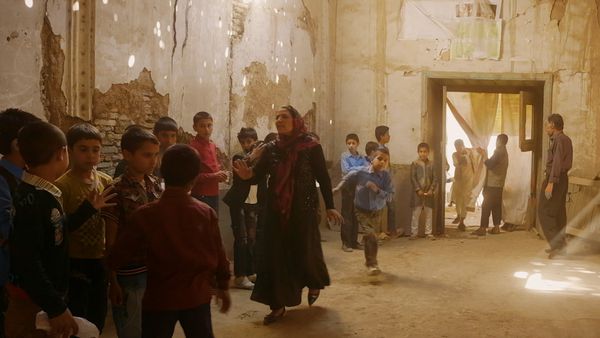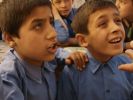Eye For Film >> Movies >> Angels Are Made Of Light (2018) Film Review
Angels Are Made Of Light
Reviewed by: Jennie Kermode

Looking at it from the outside, it's easy to think of Afghanistan purely in terms of its recent history, whether that's the conflict between the Taliban and US-led military forces or, a little further back, British colonialism, the various shahs supported by foreign governments and the Russian invasion that followed their deposition. To get any real understanding of this troubled country, however, it's necessary to look back a few centuries before that and consider how it was settled by 11 distinct peoples, each with its own language and customs, converging on its mountainous terrain as a result of population pressure and conflict on other parts of the continent. The result was a land full of inter-ethnic tension and distrust, providing fuel for ongoing strife. James Longley's documentary looks at what that legacy means today for those trying to build a better future in one Kabul school.
Daqiqi Balkhi School is built among ruins. The thriving modern city that once stood there is something its young pupils know of only from photographs. Many classes are held in large marquees erected in cleared areas nearby. There the children are taught to read, write and draw, to understand the Qur'an and to do sums. Some of them also learn English. Dari and Pashto speakers share classes so the teachers have to repeat instructions in each language whilst encouraging bilingualism. One boy laments the social gap that he feels language creates; it's something he considers to be an irresolvable problem, dooming them to enmity, yet the look he gives he gives his classmates isn't hateful, only sad.

An image that will grab the attention of many viewers early on is that of young girls happily running up to school with satchels full of books on their backs. There are female teachers too, inspiring their students and winning their affection. Girls and boys are taught separately but seem to be learning the same things; and though it is mostly the boys we follow, women's perspectives remain prominent within the film. Many people are worried about the Taliban returning once the Americans leave (something which, though it's not addressed directly, could put female teachers in danger). Others feel that until the Americans leave ordinary Afghans won't really have the chance to control their own future. There's a constant sense that war might return, a sense of urgency about cramming as much knowledge and wisdom as possible into the children before it's too late.
Part of this documentary was filmed in the run-up to an election, prompting conversations about the nature of the country's government and the importance of a properly run democratic process. One child notes that some people think the result must have been pre-determined simply because it would take ages to count so many votes. At the poll itself, an official is chided for appearing to recommend one candidate. He doesn't seem fully cognisant of why his words were problematic. There's a learning curve here too.
Everywhere we go, broken buildings and dusty streets remind us of how much has been lost. Families struggling to make ends meet pressure children to work rather than pursue education. One small boy isn't going to school because his parents can't afford to buy him a book bag. In the classroom discipline is often poor, partly because of the huge number of pupils per teacher, but somehow the work gets done and the children are really eager to learn. One boy talks about how all his knowledge of history is limited to events in his own lifetime. He wants to understand what happened in the past and how things came to be the way they are. His teacher has been told not to teach those things but slips in little anecdotes here and there in other types of lesson.
As in schools everywhere, there's class politics simmering just below the surface. One teacher tells pupils outright that it doesn't matter who wins the election because the rich will keep all the wealth for themselves regardless. Besides religion, the one thing that really unites the people we meet is their awareness of the poverty and its political dimension. Learning English and learning how to use computers is what matters, one boy suggests, because then one can keep on getting access to information.
Despite all the struggles they face and the fact that this may be only a temporary peace, the children featured here inspire a sense of hope. Longley teases out their worries but also makes us aware of their driving will. Some are quick to take control of parts of the narrative. Shot in close-up in crowded places, they reveal facts about the world as they understand it and express a hunger for more. One of them wants to craft his own story, an account focused on himself, his family and his friends. He has a way with words. For too long, Afghani people have been objectified by outsiders. One hopes that this will not be the last time we hear his voice.
Reviewed on: 01 Dec 2019














